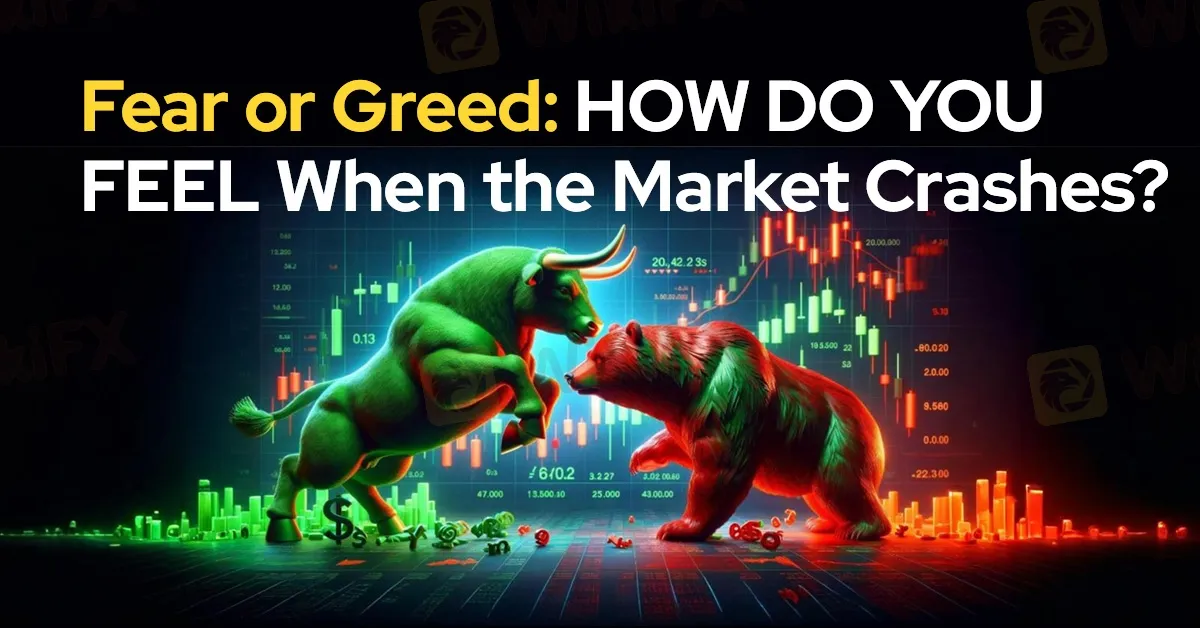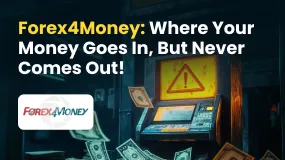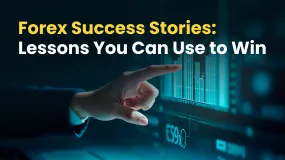简体中文
繁體中文
English
Pусский
日本語
ภาษาไทย
Tiếng Việt
Bahasa Indonesia
Español
हिन्दी
Filippiiniläinen
Français
Deutsch
Português
Türkçe
한국어
العربية
Fear or Greed: HOW DO YOU FEEL When the Market Crashes?
Abstract:Market crashes are the ultimate test for traders. When the charts turn red and asset values plummet, a fundamental question arises: do traders react out of fear or greed?

Market crashes are the ultimate test for traders. When the charts turn red and asset values plummet, a fundamental question arises: do traders react out of fear or greed? This psychological battle is at the heart of market behaviour, and understanding it can offer profound insights into the world of trading.
The psychology of fear profoundly impacts financial markets, particularly evident during periods of market instability. Panic selling is a common reaction when markets crash, as investors hastily offload assets to mitigate perceived future losses, often exacerbating the market's decline. This behaviour raises the question of whether such fear-driven actions are rational or merely emotional overreactions. Loss aversion, a well-documented psychological phenomenon, highlights that the pain of losing outweighs the pleasure of gaining, prompting traders to make impulsive decisions aimed at avoiding losses rather than evaluating potential opportunities. This instinctual response can be both a protective mechanism and a hindrance, depending on its influence on long-term strategies. Moreover, market sentiment, heavily influenced by negative news and social media, can lead to a herd mentality where fear becomes contagious. While many traders succumb to this collective anxiety, astute investors recognize the potential for buying opportunities amidst the panic. The critical question remains: are you influenced by the crowd, or do you maintain a disciplined approach in the face of market turmoil?

1. Buying the Dip: On the flip side, crashes present a golden opportunity for those driven by greed. “Buying the dip” is a popular strategy where traders purchase assets at lower prices, anticipating a rebound. This approach requires a cool head and a strong belief in market recovery. But does greed blind traders to the risks of further declines?
2. Risk-Taking Behaviour: Greedy traders often exhibit higher risk tolerance, willing to gamble on high-reward scenarios. They see market crashes as a chance to accumulate wealth quickly. While this approach can lead to substantial gains, it also carries the risk of significant losses. How do you balance the thrill of potential profits with the danger of steep losses?
3. Contrarian Thinking: Greed can foster contrarian thinking—going against the prevailing market sentiment. Contrarians thrive on identifying value where others see despair. By betting against the majority, they often reap substantial rewards. Are you bold enough to defy the crowd and seize opportunities amid the chaos?

1. Rational Decision-Making: At its core, the debate between fear and greed boils down to rational decision-making. Traders must navigate the fine line between emotional reactions and calculated strategies. In times of market turmoil, do you trust your instincts or rely on systematic analysis?
2. Long-Term Perspective: The perspective one adopts—short-term vs. long-term—greatly influences the fear vs. greed dynamic. Short-term traders may be more susceptible to emotional swings, while long-term investors might view crashes as temporary setbacks. Which perspective do you embrace, and how does it shape your trading strategy?
3. Personal Risk Tolerance: Every trader has a unique risk tolerance level. Understanding your own appetite for risk can help determine whether fear or greed dominates your trading behaviour. Are you more inclined to protect your capital at all costs, or are you willing to take bold risks for the chance of greater rewards?
As markets crash and recover, the interplay of fear and greed continues to shape the financial landscape. Reflecting on your own reactions during turbulent times can provide valuable insights into your trading psyche. Are you driven by fear, retreating at the first sign of trouble? Or does greed propel you forward, seizing opportunities amid the chaos?
Ultimately, there is no right or wrong answer. Both fear and greed have their roles in trading, and successful traders learn to harness these emotions to their advantage. The key lies in self-awareness and a balanced approach, recognizing when to heed caution and when to embrace risk.

Disclaimer:
The views in this article only represent the author's personal views, and do not constitute investment advice on this platform. This platform does not guarantee the accuracy, completeness and timeliness of the information in the article, and will not be liable for any loss caused by the use of or reliance on the information in the article.
Read more

SkyLine Judge Community: Appreciation Dinner Successfully Held in Malaysia
On August 1, 2025, the SkyLine Judge Appreciation Dinner was successfully held in Kuala Lumpur, Malaysia. As the first WikiFX SkyLine event in Malaysia this year, the dinner not only aimed to express sincere gratitude to expert judges, partners, and industry representatives who have long supported the development of the SkyLine Judge Community but also facilitated in-depth discussions on the future direction of forex trading safety, financial education, and industry transparency.

AssetsFX Scam Alert: 5 Troubling Signs
Forex trading has become a critical game now because of advancements in technology. Due to this Unfortunately, scam brokers have also entered in the Forex market. Therefore, you need to stay alert. This article aims to warn all traders and investors. Read carefully and stay aware.

Forex4Money: Where Your Money Goes In, But Never Comes Out!
Discover how Forex4Money traps investors with fake profit promises and blocked withdrawals. Read real complaints and protect yourself from this unregulated forex scam.

Forex Success Stories: Lessons You Can Use to Win
There can be many ups and downs even for the world’s best forex traders. However, they remain undeterred in their vision to overcome the challenges that come their way. That’s why they form part of forex success stories that continue to inspire generations. One can inherit some lessons to be among successful currency traders. In this article, we will be sharing the lessons you can use to be successful in forex trading.
WikiFX Broker
Latest News
Euro zone inflation holds steady at higher-than-expected 2% in July
Forex Success Stories: Lessons You Can Use to Win
Scam Alert: FCA Issued Warning! Check the List of Unauthorized Brokers Below!
FCA Forex Trading Regulations Explained – What Every Trader and Broker Must Know
FIBO Group: A Closer Look at Its Licenses
Making Money with Forex Weekend Trading
Interactive Brokers Expands Forecast Contracts to Europe
Robinhood Gains 2.3M New Accounts, Platform Assets Close to $280B
CVS shares pop on earnings beat and outlook, as retail pharmacy and insurance units improve
CNBC's Inside India newsletter: Why an India-U.K. trade deal does not make U.S.-India agreement any easier
Currency Calculator


